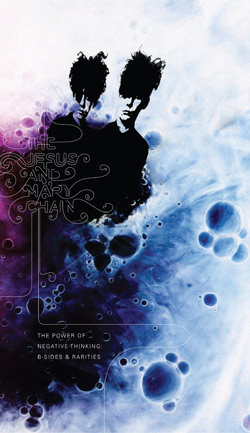
The Power of Negative Thinking:
B-Sides & Rarities
Rhino
In some respect, it seems like only yesterday that the Reid brothers were getting in a fist fight onstage, effectively putting an end to the Jesus and Mary Chain, the band the siblings formed in 1983 in their home of East Kilbride, Scotland. Truth is it’s been 10 years since that incident took place in Los Angeles, long enough for most of the ill will to dissipate, long enough for the pair to reunite, and long enough for the memory of the mediocre records the JAMC made in its latter days to be glazed over by the legacy of Psychocandy, the band’s debut that still stands as one of the greatest records ever made.
Following on this year’s remastered reissues of the band’s first five albums, Rhino has released The Power of Negative Thinking, a four-disk boxset of B-sides and rarities that essentially serves as a remastered, major expansion of Barbed Wire Kisses, the band’s B-side collection from 1988. (Everything from that album can be found here, save for a live cover of Can’s “Mushroom.”)
The Jesus and Mary Chain were at their best when taking things to extremes, frayed ends of feedback and swaths of distortion creating a wall of sound more bristled than Spector ever could have imagined. But while one might think the band was born fuzz pedal in hand, the first track, a demo titled “Up Too High,” reveals the JAMC’s first attempts to be very typical. Of course, subsequent songs “Upside Down” and a harried cover of Syd Barrett’s “Vegetable Man,” the A- and B-side, respectively, to the band’s first single, show the quantum leap they would soon make. The entirety of this disc is essential, particularly one-worders “Suck,” “Head” and “Hit” and the acoustic versions of “Taste of Cindy” and “You Trip Me Up.”
The second disc is almost as good, starting off with homages “Kill Surf City” and “Bo Diddley Is Jesus” and eventually moving onto “Rider,” “On the Wall” and “Sidewalking,” some of their strongest material post-Psychocandy. In the official capacity of Darklands the band may have shed its VU fascinations for stylized doom and gloom, but on the sidelines they were delving deeper into American rock & roll and augmenting those classic sounds with more out-there inclinations.
By the end of disc two and the beginning of disc three, the set moves into Automatic outtakes, and the Mary Chain’s affinity then for mechanized drums—and more overt pop—begins to show. Here, though, the acoustic remix of “Drop,” an album track, stands out, again showing that at the heart of everything the band has done has been great songs. Also shining above the rest, which begins to grow a bit homogenous entering the Honey’s Dead era, are a fuzzy cover of Leonard Cohen’s “Tower of Song” and an electo-fied version of “Reverberation (Doubt)” by the 13th Floor Elevators.
It’s easy to hear the end coming by disc four. By this point the Reid brothers were taking separate songwriting credits, and indeed Jim admits in the liner notes that Munki was actually recorded with the brothers working separately. Still, the material is not without merit. Short-but-sweet “The Perfect Crime” is a complimentary contrasting of cold vocals and heated guitar playing, and “I’m In with the Out Crowd” is fast and furious.
In addition to the music, though, the boxset itself is a feat of design, with beautiful acetate overlays printed in varied violet hues capturing the enigmatic qualities of the band. In addition to the liner notes’ thorough details on each song’s release, an annotated time line shows the band’s ever changing line-up. It all amounts to a compendium executed with precision and care that lives up to the sounds contained therein.
Stephen Slaybaugh
PAST PERFECTS
Kevin Ayers, What More Can I Say?
The Clash, Live at Shea Stadium
U2, Under a Blood Red Sky
Creedence Clearwater Revival, The 40th Anniversary Editions
Suicidal Tendencies, Suicidal Tendencies
Portastatic, Some Small History
Tom Verlaine, Dreamtime and Words from the Front
Wee, You Can Fly on My Aeroplane
Licorice Roots, Melodeon
Another State of Mind
Delicious Vinyl All-Stars, Rmxxology
Felt, Crumbling the Antiseptic Beauty
Siltbreeze's Tard & Further'd
U2, Boy, October and War
